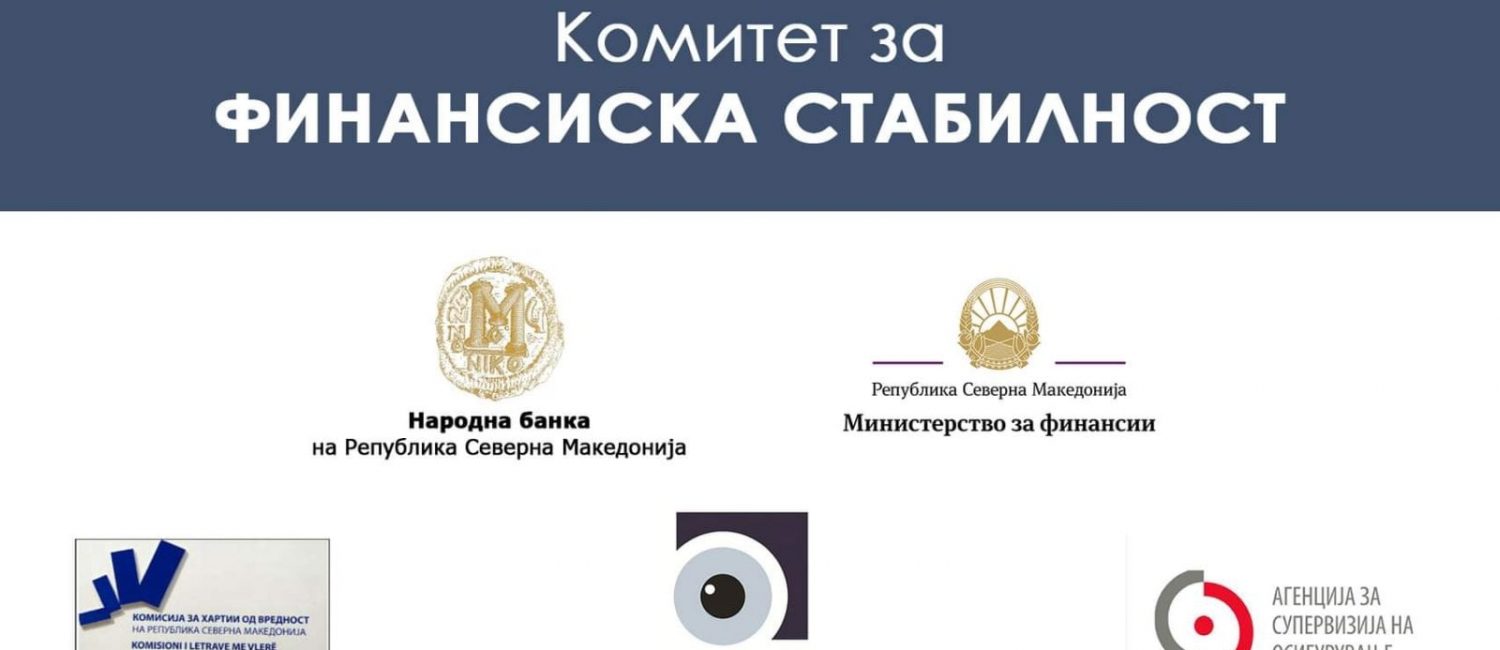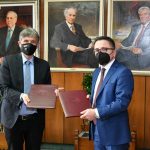The financial system has successfully responded to last year’s challenges of the corona crisis. The high regulatory requirements before the coronavirus outbreak and last year’s regulatory measures contributed towards further maintenance of its stability, as well as its readiness for further challenges. Given that the health crisis is still lasting, the regulators will continue to monitor the situation with particular vigilance, adjusting their measures and approach for preemptive purposes aimed at further strengthening of the financial stability, and thus the resilience of the system to shocks.
These are some of the findings from today’s session of the Financial Stability Committee, which presented the initial views and data on the achievements in the last year and the current situation in certain segments of the financial system in the country, in the conditions of the corona crisis. The session was chaired by the Governor of the National Bank, Anita Angelovska Bezhoska, and was attended by the Minister of Finance, Fatmir Besimi, the Chairwoman of the Securities and Exchange Commission (SEC), Nora Aliti, the Chairman of the Board of Experts of the Agency for Supervision of Fully Funded Pension Insurance (MAPAS), Maksud Ali and the President of the Council of Experts of the Insurance Supervision Agency (ISA), Krste Shajnoski.
Referring to the developments in the banking system in 2020, Governor Angelovska Bezhoska once again emphasized that it successfully responded to last year’s challenges that the health crisis imposed.
“The banking system, in conditions of extremely unpredictable environment, managed to maintain the credit cycle by registering a credit growth of 4.7%, which was financed by the solid deposit growth of nearly 6%. These achievements are supported by the solid capital and liquidity position of the system. According to preliminary data, the capital adequacy ratio of the system at the end of last year increased to 16.6%, the liquidity has traditionally being maintained at a solid level, with the share of liquid assets in total assets exceeding 30%. At the same time, the quality of the loan portfolio improved, with the share of non-performing loans in the total loans of the banking system being reduced to the historically lowest level of 3.4%. However, having in mind that the health crisis remain uncertain and its impact on the real sector, it is necessary to be cautious and to constantly monitor the possible adverse effects of the real on the banking sector through the credit risk channel. “- said Governor Angelovska Bezhoska.
In the context of the extended duration of the health crisis, the preventive measure to temporary limit the distribution and payment of dividends to banks and savings houses’ shareholders was also indicated at the meeting. It was once again emphasized that this measure is preventive, in order to further strengthen the resilience of the banking system and provide solid credit support to citizens and companies.
The Minister of Finance, Fatmir Besimi, said that the Ministry of Finance in cooperation with the National Bank is one step closer to adopting a new Law on Financial Stability and a new Law on Payment Services and Payment Systems, which will follow the best practices of the European Union and which is already set at UNERR (ENER). Besimi pointed out that despite the pandemic crisis, in 2020 the finance companies and financial leasing companies increased the value of financial placements and profits.
Besimi stressed that the Ministry of Finance pays special attention to consumer protection. For that purpose, a work group composed of members of the regulatory bodies will soon start working, having a very important and responsible task – to prepare a quality solution for greater protection of citizens who are financial services users.
Despite the fact that the securities market was under significant negative price pressures, especially in the first quarter, the trading on the Macedonian Stock Exchange was smooth and as of 31 December 2020, all market parameters exceeded the pre-pandemic level. The total annual turnover on the domestic market amounted to Denar 8.20 billion, which is an increase higher by 6% compared to 2019”- said the President of the SEC, Nora Aliti.
Analyzed by the quarterly dynamics, as Aliti said, most of the annual turnover, i.e. almost 51%, was realized in the first quarter of the year. During 2020, residents, through domestic authorized legal entities, invested a total of Euro 56.88 million in foreign markets.
“Annually, the value of MBI-10 increased slightly by 1.2%, with the growth not being dispersed, but caused by the value of shares of only three out of the ten companies that constitute the index. “The net asset value of the investment funds managed by the management companies, on 31 December 2020 amounted to Euro 145.5 million, which compared to 2019 is an increase of 3.72%.” – said the SEC President.
The first two months of this year, as Aliti said, indicate positive market performance, but a proactive approach and vigilant monitoring of the overall market infrastructure is still necessary, and at times if needed, certain corrective measures should also be taken.
“During 2020, pension funds preserved the assets stability, despite the occasional imbalances in the capital markets caused mainly by the impact of the pandemic, and at the end of 2020 exceeded the value compared to last year by about 15.3%. Hence, the analyzed MAPAS indicators show attainment of relevant results and realized return with the pension funds, which is followed by the regulated corporate governance of the pension companies”, said Maksut Ali, President of the MAPAS Council of Experts, referring to the situation and the data on the fully funded pension insurance.
Regarding the ongoing monitoring of the situation and potential risks, with particular focus on investment and operational risks, Ali pointed out that MAPAS operates within the established framework of the pension supervisors, which are recognized, indicated and confirmed by the International Organization of Pension Supervisors.
“The financial standing of the insurance sector at the end of last year has improved, and the insurance companies are solvent and liquid. The consequences of the pandemic were mainly felt through the decrease in the concluded contracts for motor vehicle insurance for traveling abroad, as well as for travel insurance and life insurance. “- said the President of the Council of Experts of ISA, Krste Shajnoski.
He indicated that the decrease in the insurance activity contributed to their profitability growth, together with the amendment to the regulation for valuation of claims based on premiums, which contributed as well to the increase in profitability. Last year, the ISA adopted three systemic rules for the operation of the insurance companies, and recently, in order to maintain and strengthen the financial condition, solvency and liquidity in the operation of companies, advised them to refrain from paying dividends on profits made last year.
“The total amount of gross written premiums in 2020 is Denar 10,059 million, which is an annual decrease of 4.8% compared to 2019 (2019: 10,563.3 million). The total assets of the insurance sector at the end of last year amounted to Denar 25,715 million and compared to the end of the year before, it increased by 7.5%. “The significant share of investments in financial instruments has been maintained at the end of 2020 as well, which is a guarantee for the stability of the sector.” – said Shajnoski, presenting the initial indicators for the insurance sector for the last year.
At the session it was emphasized that the last year’s achievements of the financial system show its readiness to respond to the challenges due to the crisis, but that, all participants in the system should have preventive cautious approach. All regulators are constantly monitoring the developments, including the potential surrounding risks and stands ready, if necessary, to adjust policies and take timely measures, in accordance with its mandate.
















